新人教版高一英语必修一-unit5-听力
- 格式:ppt
- 大小:444.00 KB
- 文档页数:10
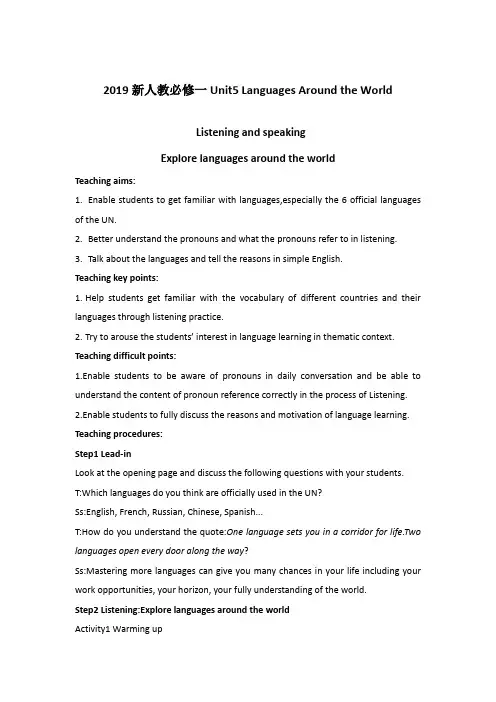
2019新人教必修一Unit5 Languages Around the WorldListening and speakingExplore languages around the worldTeaching aims:1.Enable students to get familiar with languages,especially the 6 official languages of the UN.2.Better understand the pronouns and what the pronouns refer to in listening.3.Talk about the languages and tell the reasons in simple English.Teaching key points:1.Help students get familiar with the vocabulary of different countries and their languages through listening practice.2.Try to arouse the students’ interest in language learning in thematic context. Teaching difficult points:1.Enable students to be aware of pronouns in daily conversation and be able to understand the content of pronoun reference correctly in the process of Listening.2.Enable students to fully discuss the reasons and motivation of language learning. Teaching procedures:Step1 Lead-inLook at the opening page and discuss the following questions with your students. T:Which languages do you think are officially used in the UN?Ss:English, French, Russian, Chinese, Spanish...T:How do you understand the quote:One language sets you in a corridor for life.Two languages open every door along the way?Ss:Mastering more languages can give you many chances in your life including your work opportunities, your horizon, your fully understanding of the world.Step2 Listening:Explore languages around the worldActivity1 Warming upBefore you listen, match each photo with the correct country name. Then discuss which languages are spoken in these countries.(Ex1on page 60) 1 23456 France 3 French Russia 4 Russian Germany 2 GermanSpain 6 Spanish Canada 1 English, French India 5 Hindi, EnglishActivity2: First listeningFor the first listening, you are required to tick the two languages with the most native speakers.Circle the official languages of the United Nations. And then answer the four questions below.1.What is the main topic of this speech?Learning a foreign language.2.How many languages are there in the world?Nearly 7000.3.How many people speak the UN’s official languages as their native or second language?Around 2.8 billion.4.What is the attitude of the speaker towards foreign language learning?It’s very useful to learn one or more foreign languages.Activity3 Second listeningT: Boys and girls, for the second listening, please pay special attention to the pronouns in the speech, especially focus on the italicized words in the sentences below and what they refer to.1.They think it means better job chances in the future.They:students who choose to study a UN language. it: studying a UN language2.They are spoken by around 2.8 billion people.They: the six official UN languages.Activity4 Third listeningListen to the speech for the last time and fill in the blanks with words and phrases you hear(通过最后一遍听力的练习,让学生掌握和熟悉表达态度以及原因的句式,从而为说的练习做好充足的语言支架)To some students,it seems that the only foreign language to learn is English.There are,however,nearly 7,000 languages in the world.After Chinese,the language with the most native language speakers isn’t English—it’s Spanish.Learning English is very useful,but, it is wise to learn at least one other foreign language if possible.There are many reasons why people learn a foreign language.Many students choose to study one of the languages that are spoken at the UN.As they think it means better job chances in the future.The UN has six official languages:Arabic,Chinese,French,Russian,and Spanish.They are spoken by around 2.8 billion people as their native or second language.Some students,though,choose to study a language because of family or friends.One American girl chose to learn Danish because her grandparents were from Denmark.When she was little,her grandpa used to read letters to her in Danish from their relatives in Denmark.Another young lady started learning French because she had several friends from African countries where French is spoken.Step3 Speaking1.Review the listening material and try to complete the table below.(红色部分为学生填写)2.Work in pairs or groups.Discuss which other languages you want to learn and why.(Ex5 on Page61)Example:A:What language do you want to study?B: I really want to study French. I think that the French language sounds beautiful. A:Why? Do you want to go to France some day?B: Yes, I’d love to. Also, French is used by many international organizations around the world. Do you know that FIFA’s full name is in French?A:oh, I remember that. But I don’t know how to pronounce it.Step 4 Homework1.Review the new words learnt from the listening material.2.Tell your partner what language you would love to learn in the future and why.。


新人教版(2019)必修一Unit 5 Languages around the world单元能力测试卷含听力注意事项:1.答题前填写好自己的姓名、班级、考号等信息2.请将答案正确填写在答题卡上第I卷(选择题)一、完形填空States. I was lucky enough to have an opportunity to study as a(n) ______ student from Ukraine when I was fourteen years old.I remember my first day at that school ______ it was yesterday. I was very ______ as if there had been many butterflies in my stomach. My main ______ was that I would not be able to______ myself due to the language barrier (障碍). I was trying to have as little ______ as I possibly could. And I almost ______,until we had to introduce ______ in front of the class.And the moment the word “international” flew out of my ______,I was surrounded by thirty people who were asking questions one after another. It ______ to be the opposite of less communication, but it was so much fun.During the first three months, I ______experienced a little bit of cultural shock. I think Americans are the ______ people I have ever met in my entire life. They always smile and say, “Hi, how are you?”One day, I ______ the students looking at me with doubt. Finally, one classmate ______ to my locker (寄物柜) and whispered, “Is that true that you are a princess and that you came to study here so that nobody would ______ you?” At one point, I even had an image of myself ______ a crown and gracefully waving at the crowd. People do have a wild ______!I think it was a ______ one-year experience! I saw a totally new world, experienced great culture, met a lot of incredible (极好的) people and ______ my language. This trip inspired me to learn foreign languages. That is one of the reasons ______ I speak five different languages today.1.A.international mon C.friendly D.clever2.A.even though B.as though C.now that D.in case3.A.sad fortable C.excited D.nervous4.A.point B.goal C.fear D.reason5.A.help B.express C.control D.relaxmunication B.connection C.emotion D.attention7.A.failed B.succeeded C.forgot D.won8.A.myself B.themselves C.ourselves D.himself9.A.eye B.mouth C.heart D.mind10.A.turned out B.figured out C.pointed out D.made out11.A.hardly B.certainly C.suddenly D.finally12.A.funniest B.nicest C.smartest D.worst13.A.caught B.noticed C.considered D.kept14.A.turned up B.sent up C.came up D.picked up15.A.recognize B.harm C.accept D.blame16.A.holding B.carrying C.wearing D.dressing17.A.imagination B.suggestion C.request D.desire18.A.valueless B.priceless C.terrible D.similar19.A.practised B.shared C.improved D.spread20.A.that B.which C.why D.how二、听力选择题A.She failed one of her exams.B.She is worrying about other lessons.C.She has no time to do her math homework.22.What type of food does the woman eat?A.Junk food.B.Healthy food.C.Delivered food.23.What will the man probably do to stay warm?e a blanket.B.Turn on the heater.C.Drink some hot chocolate.24.What are the speakers mainly talking about?A.The man's career.B.The man's travel plan.C.The man's plan after graduation.25.What are the speakers' opinions about the painting?A.It's simple.B.It's colorful.C.It's complex.听下面一段较长对话,回答以下小题。

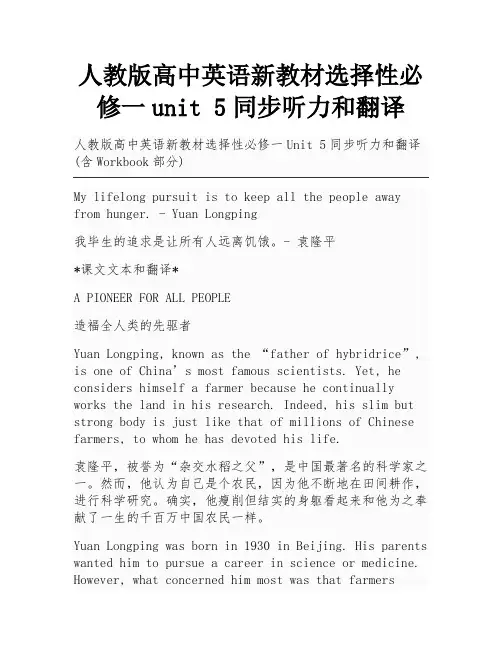
人教版高中英语新教材选择性必修一unit 5同步听力和翻译人教版高中英语新教材选择性必修一Unit 5同步听力和翻译(含Workbook部分)My lifelong pursuit is to keep all the people away from hunger. - Yuan Longping我毕生的追求是让所有人远离饥饿。
- 袁隆平*课文文本和翻译*A PIONEER FOR ALL PEOPLE造福全人类的先驱者Yuan Longping, known as the “father of hybridrice”, is one of China’s most famous scientists. Yet, he considers himself a farmer because he continually works the land in his research. Indeed, his slim but strong body is just like that of millions of Chinese farmers, to whom he has devoted his life.袁隆平,被誉为“杂交水稻之父”,是中国最著名的科学家之一。
然而,他认为自己是个农民,因为他不断地在田间耕作,进行科学研究。
确实,他瘦削但结实的身躯看起来和他为之奉献了一生的千百万中国农民一样。
Yuan Longping was born in 1930 in Beijing. His parents wanted him to pursue a career in science or medicine. However, what concerned him most was that farmersoften had poor harvests and sometimes even had a serious shortage of food to eat. To tackle this crisis, he chose to study agriculture and received aneducation at Southwest Agricultural College in Chongqing.袁隆平1930年出生于北京。
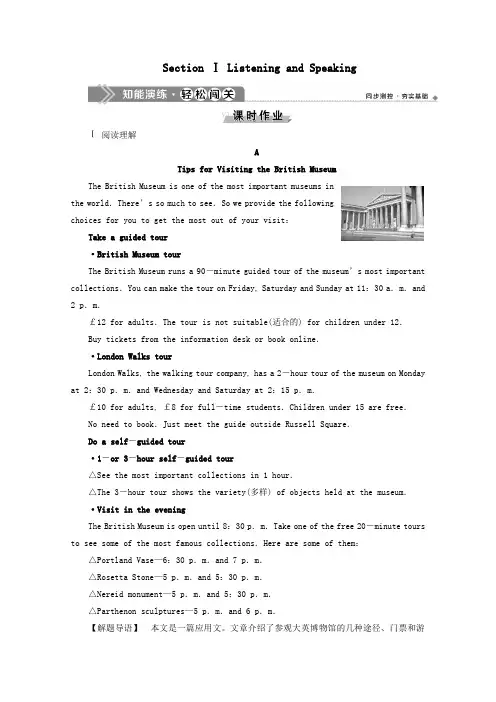
Section Ⅰ Listening and SpeakingⅠ阅读理解ATips for Visiting the British MuseumThe British Museum is one of the most important museums inthe world.There’s so much to see.So we provide the followingchoices for you to get the most out of your visit:Take a guided tour·British Museum tourThe British Museum runs a 90-minute guided tour of the museum’s most important collections.You can make the tour on Friday, Saturday and Sunday at 11:30 a.m.and 2 p.m.£12 for adults.The tour is not suitable(适合的) for children under 12.Buy tickets from the information desk or book online.·London Walks tourLondon Walks, the walking tour company, has a 2-hour tour of the museum on Monday at 2:30 p.m.and Wednesday and Saturday at 2:15 p.m.£10 for adults, £8 for full-time students.Children under 15 are free.No need to book.Just meet the guide outside Russell Square.Do a self-guided tour·1-or 3-hour self-guided tour△See the most important collections in 1 hour.△The 3-hour tour shows the variety(多样) of objects held at the museum.·Visit in the eveningThe British Museum is open until 8:30 p.m.Take one of the free 20-minute tours to see some of the most famous collections.Here are some of them:△Portland Vase—6:30 p.m.and 7 p.m.△Rosetta Stone—5 p.m.and 5:30 p.m.△Nereid monument—5 p.m.and 5:30 p.m.△Parthenon sculptures—5 p.m.and 6 p.m.【解题导语】本文是一篇应用文。
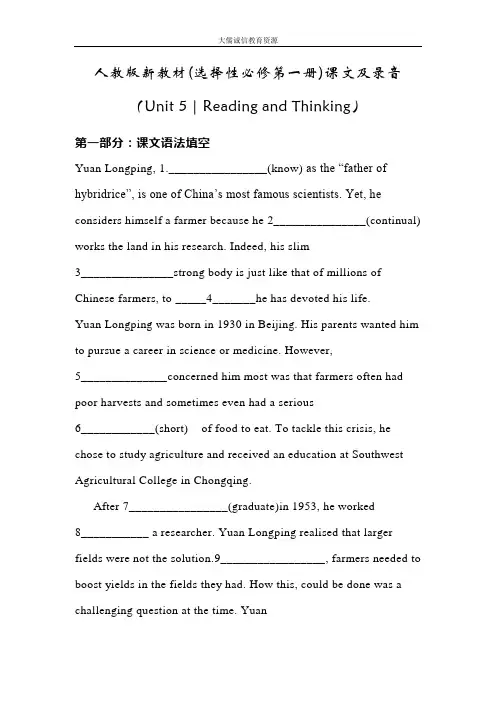
人教版新教材(选择性必修第一册)课文及录音(Unit 5 | Reading and Thinking)第一部分:课文语法填空Yuan Longping, 1.________________(know) as the “father of hybridrice”, is one of China’s most famous scientists. Yet, he considers himself a farmer because he 2_______________(continual) works the land in his research. Indeed, his slim3_______________strong body is just like that of millions of Chinese farmers, to _____4_______he has devoted his life.Yuan Longping was born in 1930 in Beijing. His parents wanted him to pursue a career in science or medicine. However,5______________concerned him most was that farmers often had poor harvests and sometimes even had a serious6____________(short) of food to eat. To tackle this crisis, he chose to study agriculture and received an education at Southwest Agricultural College in Chongqing.After 7________________(graduate)in 1953, he worked8___________ a researcher. Yuan Longping realised that larger fields were not the solution.9_________________, farmers needed to boost yields in the fields they had. How this, could be done was a challenging question at the time. Yuan10_______________(convince) that the answer could be found in the creation of hybrid rice. A hybrid is a cross between two or more varieties of a species. One characteristic of hybridsis11______________ they usually attain a higher yield than conventional crops. However, 12___________it was possible to develop a hybrid of self-pollinating plants such as rice was a matter of great debate. The common 13_______________(assume)then was that it could not be done. Through intense effort, Yuan overcame enormous technical difficulties to develop the first hybrid rice that could be used for farming in 1974. This hybrid enabled farmers to expand their output greatly.Today, it ______14__________(estimate) that about 60 percent of domestic rice consumption in China is comprised of crops generated f rom Yuan’s hybrid strains, and his strains have allowed China’s farmers to produce around 200 million tons of rice per year. Yuan’s innovation has helped feed not just China, but many other countries that depend on rice as well, such as India and Vietnam. Because of his invaluable 15________________(contribute) , Yuan Longping has received numerous awards both in China and abroad.Given that Yuan’s hybrids have made him quite wealthy, one might think he would retire to a life of leisure. However, this is far from thecase. Deep down, Yuan is still very much a farmer at heart. As a man of the soil, he cares little for celebrity or money. Instead, he makes large donations to support agricultural research.16______________impresses people most about Yuan Longpingis his ongoing ability to fulfill his dreams. Long ago, he envisioned rice plants as tall as sorghum, with each ear of rice as big as a broom, and each grain of rice as huge as a peanut. He succeeded in producing a kind of rice that could feed more people at home and abroad. His latest vision for “seawater rice” has also become a reality, and potentially opened up nearly one million square kilometres of salty land in China for rice production. 17_________________his advanced years, Yuan Longping is still young at heart and full of vision, and everyone is waiting to see what he will dream up next. 1.________________2__________________3_________________4__________________5______________6___________7_____________8___________9______________10-____________11_______________12________________________13______________ 14_____________15___________16______________17_________答案1.known2.continually3.but4.whom5.what6.shortage7.graduating8.as9.Instead10.was convinced11.that12.whether13.assumption14.is estimated15.contributions16.What17.Despite第二部分:A PIONEER FOR ALL PEOPLE造福全人类的先驱者Yuan Longping, known as the “father of hybridrice”, is one of China’s most famous scientists. Yet, he considers himself a farmer because he continually works the land in his research. Indeed, hisslim but strong body is just like that of millions of Chinese farmers, to whom he has devoted his life.袁隆平,被誉为“杂交水稻之父”,是中国最著名的科学家之一。
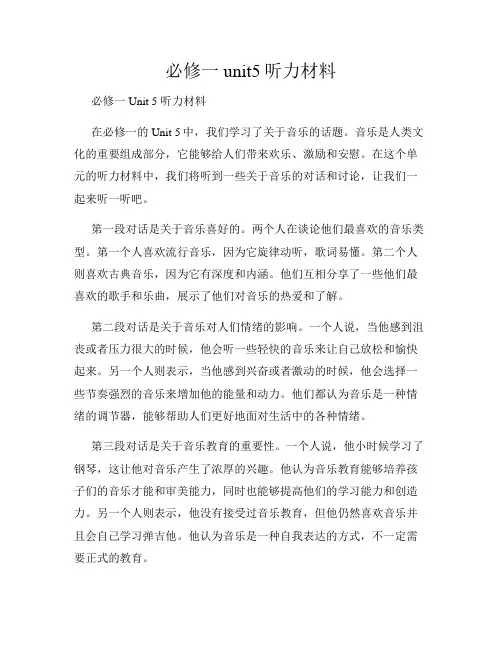
必修一unit5听力材料必修一Unit 5 听力材料在必修一的Unit 5中,我们学习了关于音乐的话题。
音乐是人类文化的重要组成部分,它能够给人们带来欢乐、激励和安慰。
在这个单元的听力材料中,我们将听到一些关于音乐的对话和讨论,让我们一起来听一听吧。
第一段对话是关于音乐喜好的。
两个人在谈论他们最喜欢的音乐类型。
第一个人喜欢流行音乐,因为它旋律动听,歌词易懂。
第二个人则喜欢古典音乐,因为它有深度和内涵。
他们互相分享了一些他们最喜欢的歌手和乐曲,展示了他们对音乐的热爱和了解。
第二段对话是关于音乐对人们情绪的影响。
一个人说,当他感到沮丧或者压力很大的时候,他会听一些轻快的音乐来让自己放松和愉快起来。
另一个人则表示,当他感到兴奋或者激动的时候,他会选择一些节奏强烈的音乐来增加他的能量和动力。
他们都认为音乐是一种情绪的调节器,能够帮助人们更好地面对生活中的各种情绪。
第三段对话是关于音乐教育的重要性。
一个人说,他小时候学习了钢琴,这让他对音乐产生了浓厚的兴趣。
他认为音乐教育能够培养孩子们的音乐才能和审美能力,同时也能够提高他们的学习能力和创造力。
另一个人则表示,他没有接受过音乐教育,但他仍然喜欢音乐并且会自己学习弹吉他。
他认为音乐是一种自我表达的方式,不一定需要正式的教育。
通过这些对话,我们可以看到音乐在人们生活中的重要性。
它不仅仅是一种娱乐方式,更是一种情感的表达和沟通方式。
无论是喜欢流行音乐还是古典音乐,无论是通过正式的音乐教育还是自学,音乐都能够给人们带来快乐和启发。
在学习这个单元的过程中,我们还可以通过听音乐来提高我们的听力能力。
我们可以选择一些我们喜欢的歌曲,仔细听歌词,尝试理解其中的意思。
我们也可以尝试听一些不同类型的音乐,拓宽我们的音乐视野。
通过这样的方式,我们不仅能够提高我们的听力技巧,还能够享受音乐带来的愉悦和享受。
总之,音乐是我们生活中不可或缺的一部分。
它能够给我们带来欢乐、激励和安慰。
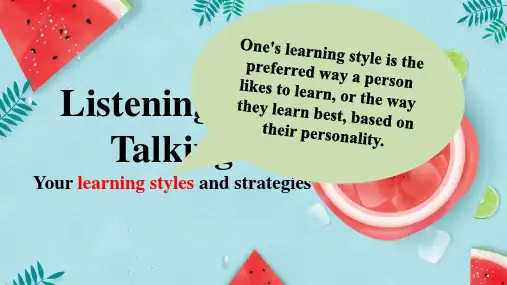
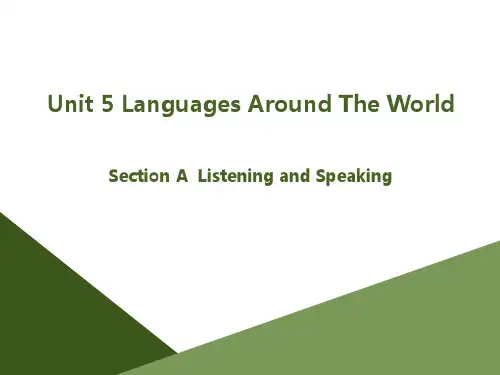

人教版英语必修一unit5单词听力Title: Enhancing Listening Skills: Strategies for Mastering Unit 5 Vocabulary in People's Education Edition EnglishListening comprehension is an indispensable aspect of language acquisition, particularly in mastering new vocabulary. In the People's Education Edition English curriculum, Unit 5 presents a unique set of words requiring attentive listening and comprehension. To excel in this endeavor, learners must employ effective strategies tailored to enhance their listening skills.Firstly, active engagement is paramount. Encourage students to immerse themselves in English audio materials, such as podcasts, news broadcasts, and audiobooks, to familiarize themselves with various accents, intonations, and speech patterns. This exposure cultivates adaptability and sharpens their ability to comprehend diverse forms of spoken English, thus facilitating their grasp of Unit 5 vocabulary during listening exercises.Secondly, prelistening activities serve as valuable preparation. Before delving into listening exercises, students should preview the vocabulary featured in Unit 5. By familiarizing themselves with the words' meanings and context, learners can anticipate key terms during listening tasks, enabling them to decipher unfamiliar phrases more effectively. Additionally, activating prior knowledge related to the unit's theme enhances comprehension and aids in connecting new vocabulary with existing linguistic knowledge.Furthermore, the implementation of interactive listening tasks promotes engagement and collaboration. Incorporating group discussions, roleplaying scenarios, and peertopeer interactions into listening exercises encourages active participation and strengthens comprehension skills. By engaging in dialogue and exchanging ideas, students reinforce their understanding of Unit 5 vocabulary while honing their communication abilities in reallife contexts.Moreover, leveraging multimedia resources enhances the effectiveness of listening activities. Integrating visual aids, such as videos or images, alongside audio materials provides contextual clues and reinforces vocabulary retention. Furthermore, interactive online platforms offer adaptive listening exercises tailored to individual proficiency levels, enabling personalized learning experiences that cater to diverse learning styles and preferences.Additionally, postlistening reflection consolidates learning outcomes. Encourage students to reflect on their listening experiences, identifying challenges encountered and strategies employed during comprehension tasks. By fostering metacognitive awareness, learners develop a deeper understanding of their strengths and areas for improvement, empowering them to refine their listening skills effectively.In conclusion, mastering Unit 5 vocabulary in the People's Education Edition English curriculum necessitates the cultivation of proficient listening skills. By implementing diverse strategies, including active engagement, prelistening preparation, interactive tasks, multimedia integration, and postlistening reflection, educators can empower students to navigate listening exercises with confidence and proficiency. Through dedicated practice and strategic intervention, learners can enhance their linguistic proficiency and achieve success in their English language endeavors.。
人教版新课标高中一年级(必修一) Unit 5 NelsonMandela—a modern hero第一部分听力(共二节,满分30分)第一节(共5 小题; 每小题1.5 分,满分7.5分)听下面5 段对话,每段对话后有一个小题,从题中所给的A、B、C三个选项中选出最佳选项,并标在试卷的相应位置。
听完每段对话后,你都有10 秒钟的时间来回答有关小题和阅读下一小题。
每段对话仅读一遍。
1. Where does this conversation take place?A. At a hospital.B. At a department store.C. At a restaurant.2. How much is the food and drink?A.$2.65.B. $2.75.C. $2.95.3. What’s the man doing?A. Watching TV.B. Turning down the TV.C. Answering the phone.4. According to the man, what does he like to do if possible?A. To visit museums.B. To make a good plan.C. To visit the Modern Museum.5. What news did the woman get from the man?A. Sam will leave New Y ork very soon.B. Sam’s sister will leave for Los A ngeles very soon.C. Sam’s sister will leave for New Y ork very soon.第二节(共15小题; 每小题1.5分, 满分22.5分)听一下面5段对话或独白。
每段对话或独白后有几个小题, 从每题所给的A、B、C三个选项中选出最佳选项, 并标在试卷的相应位置。
新人教高一英语必修一课本听力与视频材料原文Unit 5Languages Around the WorldListening and SpeakingTo some students, it seems that the only foreign language to learn is English. There are, however, near 7, 000 languages in the world. After Chinese, the language with the most native language speakers isn’t English----it's Spanish! Learning English is very useful, but it is wise to learn at least one other foreign language, if possible.There are many reasons why people learn a foreign language. Many students choose to study one of the languages that are spoken at the UN. As they think it means better job chances in the future. The UN has six official languages: Arabic, Chinese, English, French, Russian, and Spanish. They are spoken by around 2.8 billion people as their native or second languages.Some students, though, choose to study a language because of family or friends. One American girl chose to learn Danish because her grandparents were from Denmark. When she was little, her grandpa used to read letters to her in Danish from their relatives in Denmark. Another young lady started learning French because she had several friends from African countries where French is spoken.What do you think? Which other language would you choose to study and why?Listening and TalkingLISTENNG PART 1As many countries speak English as a first language, there are many different kinds of English around the world: British English, American English, Australian English, and many others. Some English learners might ask, " Can English speakers from different countries all understand each other? " The answer is yes. People in these countries can usually understand each other with very few problems. There are differences in vocabulary, pronunciation, and grammar, but those are usually not big problems. However those differences can cause confusion for non-native English speakers. For example, a student who has learnt British English might not be familiar with the different vocabulary that an American might use. Listen to this conversation between a foreign language student and her American classmateLISTENING PART 2Amy: Thank you very much for helping me with my EnglishBetty:You're welcome! When are you free to meet? This semester, I’m free on Tuesday and Thursday after lunch.Amy: I’m sorry? What does “semester” mean?Betty: You know, semester---- half of a school yearAmy: Oh, you mean like a term?Betty:Yes, like a term. The British say "term". We usually say "semester" here in America.Amy:Got it! My first English lesson with you, haha? OK, let's meet on Tuesday. Where shall we meet?Betty:Let's meet at a coffee shop near my home. It's very convenient to get there by subwayAmy:Subway? Do you mean the Underground?Betty:Yes, the train that goes under the ground!Amy:Ah, got it! Haha, my second English lesson---- thank you!*Video TimeChinese CharactersThe history of Chinese characters dates back to ancient times, with a history of at least several thousand years. There are many tales and legends about the origin of hanzi, Chinese characters: there is Cangjie, the legendary inventor of Chinese characters; the ancient practice of knot-tying: the eight trigrams; and ancient painting legends, to name a few.It is generally agreed that hanzi began as simple pictures, images that the ancient Chinese people drew, painted, or carved to describe nature or their lives. Other ancient cultures developed picture-basedwriting systems as well, such as the hieroglyphs of ancient Egypt or the script of the ancient Mayan civilisation. Hanzi, however, is the only one of these ancient writing systems to survive. Today, Chinese characters are the oldest continuously used system of writing in the world.Researchers generally agree that the oldest symbols recognisable as Chinese characters are those found on ancient oracle bones. These 3000-year-old symbols, known as jiaguwen, were carved on turtle shells or bones of animals. The jiaguwen can give all of us in the modern era insight into how ancient Chinese saw the world around them and into their great creativity in expressing their observations.Take, for example, the modern character jia, meaning home or family. The jiaguwen character looks like a house with a nice pig inside, originating from the ancient idea that a good family home has plenty food. Over thousands of years, this hanzi evolved into a variety of different forms but finally developed in a more stable manner after the unification of China under Emperor Qinshihuang.When you first look at Chinese characters, you will most likely feel that they are very complicated However, if you know just a little about how these characters are formed, you will find that they are not nearly as difficult as they seem. About 80% of Chinese characters are composed of smaller parts, known as radicals, which are combined in many different ways to form tens of thousands of hanzi. Fortunately you need to knowonly about two or three thousand characters for use in daily life.Chinese characters and Chinese culture are inseparably linked. China's unified writing system forms a strong bridge linking the Chinese people and culture of the present with those of the past. No matter when or where you live, if you can read Chinese, you can read ancient Chinese classics. It is truly an amazing thing to be able to hear the thoughts and observations of people from thousands of years ago.As China takes its place in the international community, the Chinese writing system has spread to other countries. Today, many international students are studying Chinese, both the spoken and written language, and are coming to appreciate Chinas fascinating culture. And, as China’s culture and society have continued to develop, the amazingly versatile Chinese characters (hanzi) have been adapted for use in digital format on computers and other devices And so written Chinese lives on, spreading Chinese culture wherever It goes.。